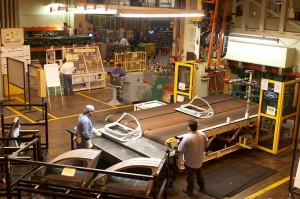Despite a campaign promise by Pres. Donald Trump to curb their import, sales of Mexican-made cars, trucks and crossovers surged to an all-time high in 2017.
In all, 2.33 million vehicles were shipped to the U.S. from assembly lines “South of the border,” a 9.4% increase over 2016, according to Mexican auto industry data. That reflects a variety of factors, including the opening of new Mexican assembly plants, including an Audi factory that last year became the sole global source of the carmaker’s popular Q5 crossover-utility vehicle.
The surge could create some political headaches for Mexico, however. During his 2016 campaign, then-candidate Trump sharply criticized carmakers like Ford for importing cars from Mexico and warned he would impose “a big border tax.” While Trump hasn’t followed up on that threat his administration’s chief trade representative is engaged in a high-stakes bid to renegotiate the North American Free Trade Agreement that helped boost the Mexican auto industry.
Since NAFTA was enacted, Mexico has become one of the world’s largest automotive manufacturers. All but a handful of global automakers now run plants in the country and manufacturers like Nissan and Volkswagen have sharply ramped up production there in recent years.
(Ford moving EV production from Michigan to Mexico. Click Here for the story.)
The industry has been drawn to Mexico for several reasons. That includes low wages that are on a par with what workers make in many third-world nations. But Mexico also has the advantage of having negotiated more free trade agreements than any other country except Israel. That has allowed it to serve as a convenient manufacturing site for companies like Audi, which wanted to consolidate production of the Q5 in a single plant.
While Mexican-made vehicles are now shipped all over the world, the U.S. remains the country’s biggest customer, absorbing 75% of the vehicles made there that were earmarked for export. Canada, at 8%, is the second-largest customer.
During the 2016 presidential campaign, Trump repeatedly turned to the issue of Mexican automotive imports, often using Ford as his whipping boy. The second-largest of the Detroit automakers operates a large plant in Hermosillo and had been planning to add a second factory to build small cars like the Focus, which were being moved out of Michigan. Ford ultimately canceled plans for the new Mexican factory – but rather than remain in the U.S., Focus production will now be consolidated in a Chinese plant.
Ironically, Ford was one of the few carmakers who saw a drop in Mexican imports last year, a downturn reflecting the shift in American market demand from passenger cars to light trucks. The automaker’s Hermosillo factory currently builds sedans like the Fusion, Focus and Lincoln MKZ. Ford recently signaled to suppliers that it may end production of the midsize Fusion because of declining demand.
(Click Here for details about the Big Three lobbying VP Mike Pence to leave NAFTA intact.)
Nissan, which has been the largest brand in the Mexican market, and one of the country’s largest automotive manufacturers, also saw a drop in exports in 2017.
But most other Mexican plants were struggling to keep up with demand. That includes the new Audi factory and the massive Puebla complex operated by the luxury brand’s parent, Volkswagen.
Demand grew especially fast for Mexican-made SUVs and pickups, such as the Ram 1500 truck produced in Mexico by Fiat Chrysler Automobiles. Overall, FCA exports surged 35.5% for the year. General Motors reported a 26.3% increase, boosted by U.S. sales of the Chevrolet Silverado and GMC Sierra pickups.
While federal officials have not commented on the increase in imports of Mexican-made vehicles, the news is all but certain to become a factor in ongoing negotiations aimed at revising NAFTA. Trump has even warned that he could kill the trade alliance, which also includes Canada, if he doesn’t get an acceptable deal.
(To get the latest on NAFTA negotiations, Click Here.)
Automakers and their trade groups have warned, however, that any changes could negatively impact the industry and drive up vehicle costs for consumers. The auto industry has built up a massive and tightly interconnected network of plants in the North American region, said David Cole, director-emeritus of the Center for Automotive Research, in Ann Arbor, Michigan. And erecting new barriers could cost the industry billions of dollars and reduce the efficiency of plants in all three countries.



It is global market place where transportation has made it possible to build and transport manufactured goods to any market place where they can be sold. It better to be part of the distribution network than on the outside looking in. America First is one way to shut the door on import / export.
We need be very careful before trying to close the door on imports (and having the door closed on our exports). We tried that 90 years ago and it was one of the factors that helped trigger the Great Depression.
Paul E.